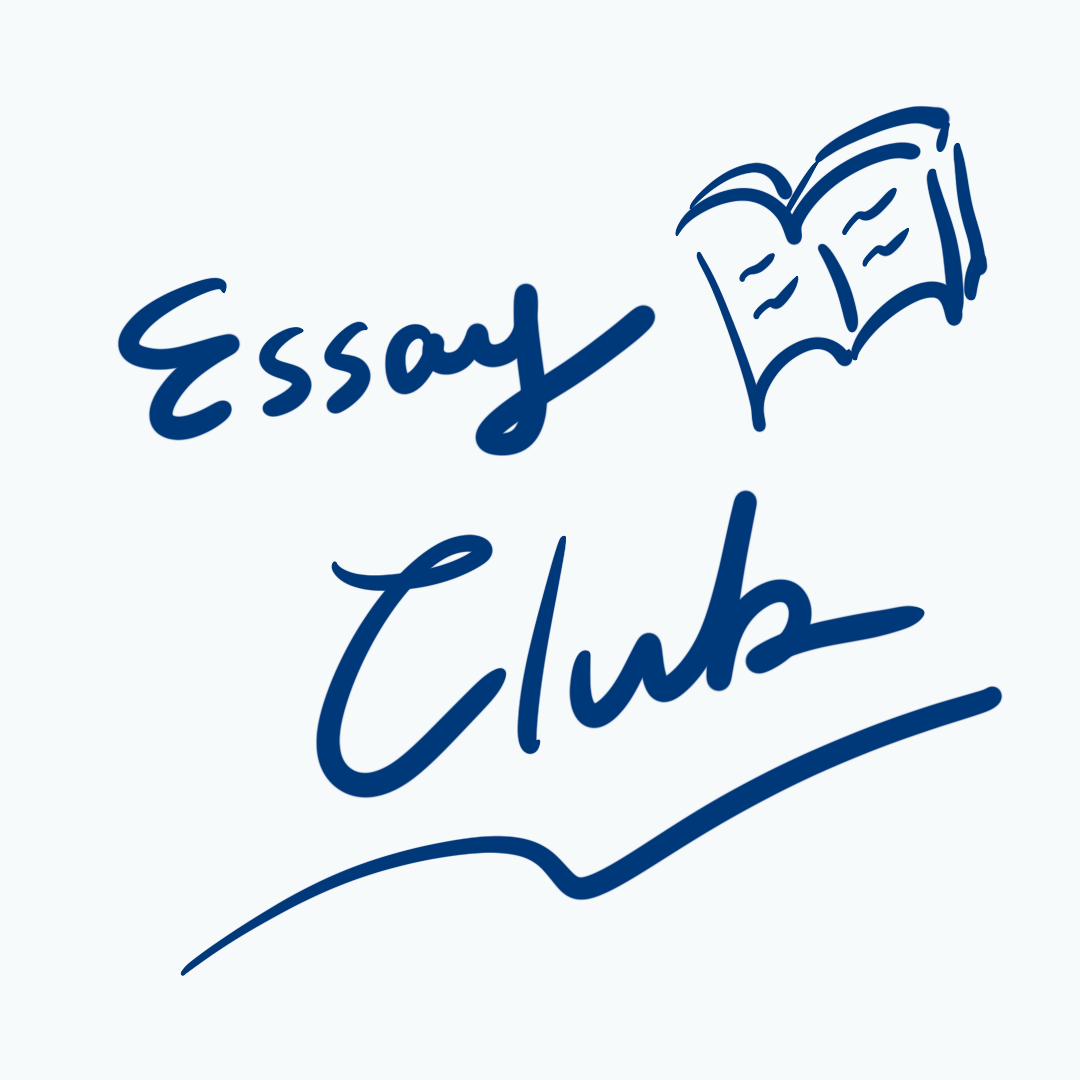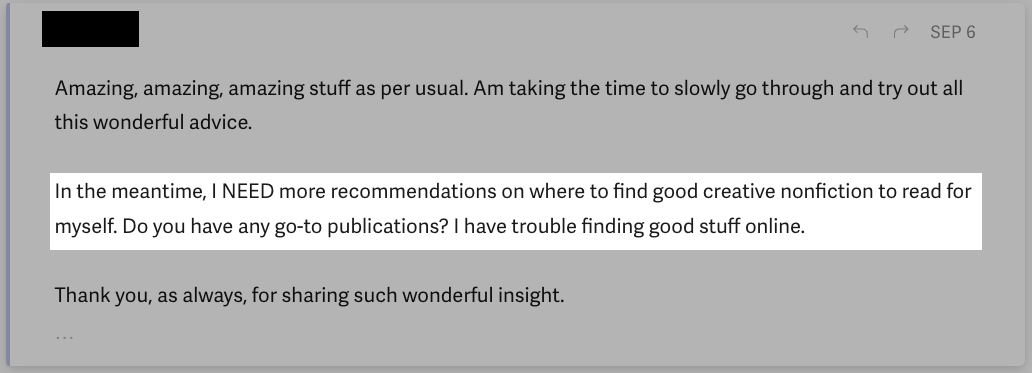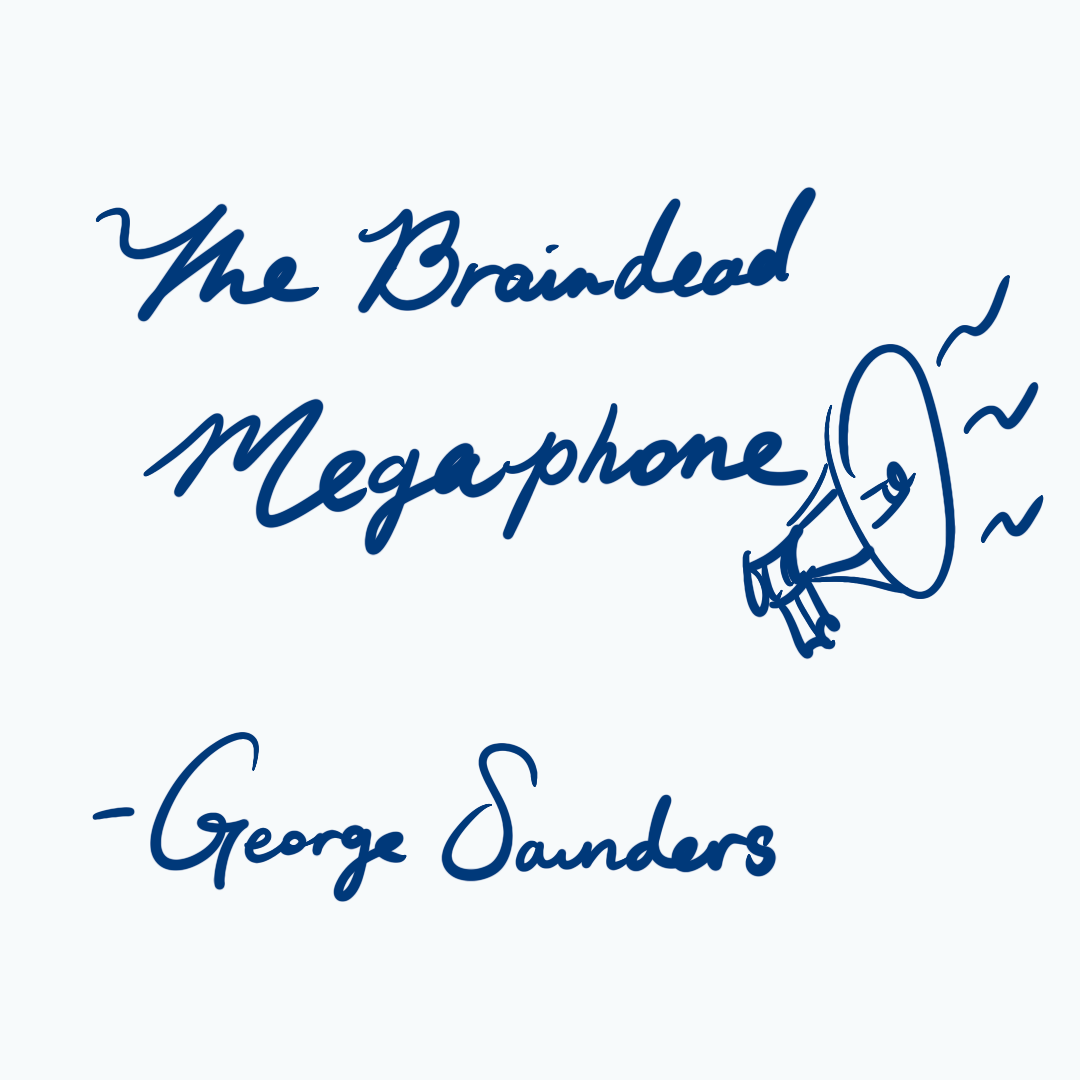There are lots of ways to improve as a writer, and practicing consistently works for many people.
But if you've been writing regularly and haven't seen the breakthrough you're hoping for, you may discover the missing piece is learning to think like a reader.
This week's newsletter is about why reading makes you a better writer, how to develop your critical vocabulary, and the tools you need to talk about writing effectively with others. Let's go!
In this week's issue 💌
- Gain creative control and confidence by understanding why your writing works (or doesn't)
- The secret to writing about music
- Overcome writers block with eight tried-and-true strategies
Writer Science Experiment 🧪

Last month I posted a video tutorial about creative nonfiction. Your response was overwhelming.
Sometimes writing this newsletter can feel like shouting into the void (though I still enjoy it—maybe a better image would be 'singing in the shower'). So when you respond, I hear you loud and clear.
Many of you reached out, in video comments and email replies, to say how excited you felt in discovering the genre of creative nonfiction. Some of you asked for more.

So I'd like to propose an experiment: every so often, let's read a creative nonfiction essay together.
- First, I'll post the essay, along with a brief introduction and discussion prompt to get us started.
- Then, you'll read the essay and share your thoughts in the comments. You can respond to my discussion prompt, or start a topic of your own.
- Finally, after we've all had some time to absorb the essay and chat, I'll do a livestream on YouTube. This video will be unlisted, just for newsletter subscribers. In this video, I'll share my impressions of the essay, do a roundup of your comments, and respond to anyone tuned in to the live broadcast.
If you'd like to participate, the first essay club post is live:

Interesting stories & ideas 📚
- Did you see One Battle After Another? Paul Thomas Anderson's new movie, adapted from a Thomas Pynchon novel. If you've always wanted to get into Pynchon but not sure where to start, here's an excellent introduction to Thomas Pynchon: Pynchon: An Introduction
- "Writing about music is like dancing about architecture," said someone who clearly never read Alex Ross. The New Yorker's music critic, Ross is classically trained and raised without pop music, and he has an incredible way of describing music that both captures it precisely and makes you excited to learn more. A great place to start is his 2001 profile of Radiohead: Becoming Radiohead
- An old video of mine suddenly blew up on 𝕏, so in case you missed it: If you learned to write from The Elements of Style by Strunk & White, I've got bad news for you.
Get Writing Done 🧑💻

If you're struggling to maintain a consistent writing practice, the biggest obstacle isn't talent or inspiration—it's fear.
Most aspiring writers quit within months, not because they lack ability, but because they can't manage the resistance between intention and execution. Writer's block isn't a mysterious creative curse; it's fear disguised as procrastination, perfectionism, and endless preparation.
After building my entire career in writing, I've discovered that successful writers aren't always the most talented ones. They're the ones who figured out how to work alongside their fear, and who keep publishing anyway.
The problem with traditional advice
Fear manifests differently than you might expect.
You don't feel it when writing emails or routine content. It only emerges when you're trying to create something that genuinely connects with people—work that makes them think differently, helps solve problems, or makes them feel less alone.
Traditional writing advice fails because it ignores this psychological reality.
- Generic tips about inspiration don't address resistance.
- Word count goals create anxiety without building habits.
- And many writers never actually implement the advice they receive.
Eight strategies that work
Here are eight tried-and-tested techniques to build a sustainable writing practice that generates consistent output:
#1 Write daily to make it automatic. Establish a consistent morning schedule when willpower is strongest. Even 30 minutes counts. Research shows it takes 66 days to build automaticity, so commit to two months of discipline.
#2 Set small achievable goals and meet them. Become a goal-meeting person, not a superhuman output machine. Forgive yourself when you miss a day. Never add today's "gap" to tomorrow's task—that spiral kills momentum.
#3 Avoid virtuous procrastination. Website redesigns, endless research, and social media optimization feel productive but serve fear's agenda. Your job is creating meaningful work, not becoming a platform optimization expert.
#4 Make fear an ally. Use fear to identify where genuine intellectual work lies. When you're scared of a connection or transition, that terror often points toward your piece's most important insight.
#5 Start poor, finish rich. Don't worry about concision when drafting. You can only cut ruthlessly when you have plenty to spare. Cutting 50 pages from 210 is easy; cutting 10 from 20 is devastating.
For all 8 steps, check out the video tutorial about how to overcome writer's block and get writing done:

Watch the full tutorial
Editor's Choice ✨

Enjoy this newsletter? Forward it to a friend, or hit reply to share your thoughts. I'd love to hear from you!
Work with Me: Get feedback on your writing and actionable advice through a 1:1 consultation with me – apply here
Donating = loving 🥰 Leave a tip to help support this publication

